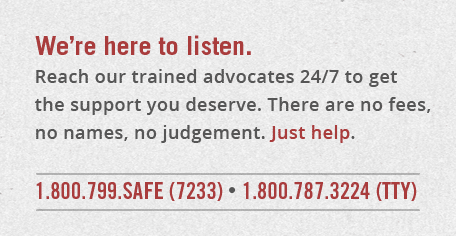• Also See Abuse | Counseling
At least one in four women experiences violence from her partner at some point in her adult life. And tragically, that rate is no different among Christian homes and the homes of other faiths or no faith. In fact, research shows Christian women stay far longer in the abusive context and in far more severe abuse than their non-Christian counterparts.
Women caught up in the cycle of abuse may think, I can’t leave this abusive situation because the Bible says divorce is wrong. Likewise, abusive husbands may claim, The Bible commands that my wife should be submissive to me.
Abusive men often distort the Bible to support their right to abuse. We even know of clergy who have said to abuse victims, “Jesus’ wounds were redemptive—they saved the world. Your wounds can be redemptive and save your relationship.” Similarly, we know of pastors who counseled abused women: “If you just submit to your husband, even if he is abusive, God will honor your obedience and the abuse will either stop or God will give you the grace to endure the abuse.”

Some even misapply 1 Peter 1:6: “In all this you greatly rejoice, though now for little while you may have had to suffer grief in all kinds of trials.” This verse has been grossly misused to tell women they should accept abuse and use their suffering as an opportunity to grow their faith.
It is true that people suffer in all kinds of ways. It is also true that Jesus’ life, death, and resurrection paint a picture of suffering that leads to glory. This theme that suffering can be redemptive is found throughout the New Testament. In fact, the apostle Paul says, “All who desire to live a godly life in Christ Jesus will be persecuted” (2 Timothy 3:12), and he told the first churches that “through many tribulations we must enter the kingdom of God” (Acts 14:22). Certainly suffering has the potential to strip us of ingrained attitudes and habits that lead us away from God. It also has the potential to drive us deeper into trust and dependence upon God.
But the problem with the above arguments for staying within abuse is that God never calls us into violence if it can be avoided. We are not called to passively accept every form of unjust pain that comes our way–especially not abuse.
You were not created to suffer
Scripture shows us a complex, multifaceted view of human suffering, so we must not be simplistic in our counsel to ourselves and to others who face unjust suffering. The Bible doesn’t encourage people to endure avoidable suffering and it does encourage them to avoid unnecessary suffering. Don’t fall into the trap of thinking that if you decide to take steps to end the abuse, you are being a bad Christian. Remember, Jesus stood up for the dignity of many women when others looked down on them–he gave them not only a sense of self-worth but a practical way out (as he did for the woman about to be stoned in John 8), rather than telling them to become more accepting of their circumstances.
The reason for this goes back to the beginning: you were not created to suffer. Suffering and pain are a result of sin entering the world. While God mysteriously works within the confines of an evil and suffering world, transforming these things for his own purpose, he himself is good and does not delight in the suffering of the world. He takes “no pleasure in the death of the wicked” (Ezekiel. 33:11) and does not tempt anyone to evil (James 1:13). Instead, it is from him that we receive “every good gift and every perfect gift” (James 1:17).
Free to Flee
Suffering, abuse, and pain are not part of God’s original intention for creation, nor for the world to come. One of the best things pastors, ministry leaders, friends, and family can do for a victim of abuse is to assure her of this very truth.
In the Bible are numerous stories of godly people repeatedly avoiding abuse and assault by hiding, fleeing from, and maintaining physical separation from an abuser. Following these biblical examples, abused women should be encouraged to flee from abusers. Others should assist victims in every way they can to find safety and physical security. While an abused woman with no children has strong biblical warrant to flee an abusive husband, she has additional warrant to do so if she has children.
But what about my vows?
Some abused women believed that teaching on the permanence of marriage requires them to stay in an abusive relationship. But no person is expected to stay in an abusive marriage.
Marriage is a covenant; divorce is the breaking of that covenant. When a man chooses to be abusive, he breaks the covenant. An abusive man forfeits the right to remain married unless the woman wants to stay married to him. If his wife chooses to divorce him, she is making public his breaking of the covenant, and this does not go against what the Bible says about divorce. It is the abuser who must be confronted concerning his or her breaking of the marriage covenant.
Abuse, specifically, is a form of oppression that twists God’s good intention of marriage. One scholar put it this way: “Spousal abuse not only violates an individual victim but also ravages the covenant of marriage itself, affecting families, society, and the community charged with sustaining promises of faithful love.” If God provides the means to flee and find healing, take it—and encourage the same choice for others.
One common reason abused women stay in the relationship is because they believe God wills them to. However, when we realize that allowing oneself to be abused in no way furthers the gospel, this argument is made invalid. Abused women are not expected to continue receiving abuse from anyone, especially in a way that enables the sin of their abuser to keep perpetuating itself.
Remember, God’s purpose is shalom. Violence works at cross purposes with shalom, and God does not want you to suffer under it. Fleeing from abuse so that you and your children are safe is a means of deliverance from the Lord. And it’s also in the best interest of the abuser, because he is no longer enabled to act out this pattern of sin. The abuser is someone who needs to come to the end of himself to see his need for help.
If you are in an abusive relationship, we know you are in a complex, dangerous, and desperate situation. When you are in this place, it seems that no choice is easy to make. But we also believe that God has better things in mind for you than to stay in your suffering.
One scholar put it this way: “It is up to us to choose where we place ourselves: on the side of violence and death or on the side of peace and life. Fatalism and existence doomed to violence are not a part of biblical thinking. As the biblical text exhorts: ‘Choose then life, that you may live; you and your children after you’ (Deuteronomy 30:19).”
From Is it My Fault? Hope and Healing for Those Suffering Domestic Violence by Justin S. Holcomb and Lindsey A. Holcomb, ©2014. Used with permission of Moody Publishers.
• Also See Abuse | Counseling












